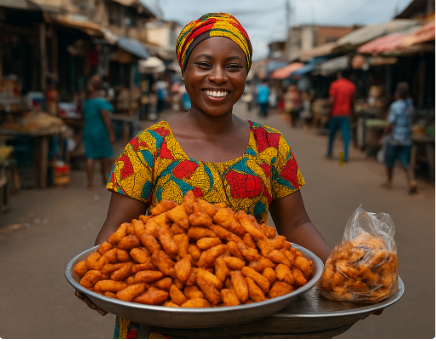Got a camera — or a strong smartphone camera? Awesome. In 2025 the stock-photo game looks different from 2018: big platform consolidation, AI-powered editing and search, more distribution tools, and a huge underserved market for authentic African images. If you can shoot consistently, prepare metadata, and upload smartly, you can build a steady income stream and if you focus on real African life (scenes, markets, food, fashion, tech in Accra, cocoa farms, etc.) you’ll likely face far less competition and earn more per image.
Below is an updated, practical guide you can use today with tools, Ghana-specific sources, a simple business model, and an easy publishing workflow.
Why this is still a great idea (and why African images are especially valuable)
Visual content demand keeps growing: websites, social media, apps, advertisers, NGOs and even AI dataset builders need authentic photos. Yet many mainstream stock libraries remain saturated with similar “business people in suits” shots and under-supplied in high-quality, authentic African content. That creates an opening: a consistent, high-quality library of Ghanaian/African images can become a valuable asset and steady income stream.
Buyers worldwide often pay a premium for authentic, hard-to-find imagery so authenticity matters.
What changed since 2018
- AI: AI tools now speed editing (denoise, upscale, background repair), speed keyword suggestions, and create derivative content — but agencies require clear disclosure for AI-generated assets. TechRadarSFGATE
- Platform shifts: Big mergers and consolidation are reshaping the industry (e.g., Getty + Shutterstock moves in 2025). That affects licensing options and buyer behavior. Reuters
- Distribution tools: Services like Wirestock let you distribute to multiple marketplaces from one dashboard, saving time. (They also have payout/support info for PayPal/Payoneer). Wirestock+1
- Local payment routes: Payoneer and PayPal remain go-to payout options; Ghana-based creators use Payoneer then withdraw to local bank accounts/mobile-money systems. PayoneerOneSafe
Where to sell your photos (2025 shortlist)
Shutterstock / Adobe Stock / Getty Images (iStock) — still major marketplaces with large buyer bases (note consolidation). ReutersReddit
- Alamy — higher royalties for some content.
- Depositphotos, Dreamstime — alternatives with steady traffic.
- Wirestock — helps you upload once and distribute to many sites; supports PayPal and Payoneer. Wirestock+1
- Niche & free platforms (Pexels, Unsplash) — good for exposure and lead-gen (not ideal if you need direct revenue).
Tools & accessories to buy in Ghana (practical shopping list)
You don’t need the most expensive gear to sell stock but quality, consistency, and lighting matter.
Cameras & Devices
- Mirrorless/DSLR: Canon, Sony, Nikon — if budget allows.
- Smartphones: iPhone 14–15 series, Samsung Galaxy S/U series, or Google Pixel 7–9 are excellent for stock when paired with good technique.
Tripods, lights, accessories (available on Jumia Ghana, Melcom, CompuGhana, Franko Trading)
- Tripods & monopods (Manfrotto alternatives). Jumia Ghana+1
- LED panels, softboxes, ring lights. Jumia Ghana
- Extra batteries, SD cards, lens cleaning kit.
Where to shop in Ghana
Jumia Ghana — wide range of cameras, tripods and lighting. Jumia Ghana+1
Melcom — consumer electronics and accessories.
CompuGhana / Franko Trading — phones, laptops & higher-end gear. Franko Trading Enterprise
Software & AI tools for editing and keywording
- Adobe Lightroom & Photoshop — still the industry standard for granular control.
- Luminar Neo — fast, AI-driven enhancements (sky, relight, noise reduction). Great for time-saving one-click edits. SFGATETechRadar
- Topaz Labs — AI sharpening, denoise and upscaling for older images.
- Remove.bg — fast background removal for creative composites.
- Canva Pro — quick marketing edits and social assets.
- Keyword helpers: Wirestock AI keywords or Keyword.io — saves huge time tagging images. Wirestock
Legal & submission rules (what stock sites want)
No copyrighted logos or trademarks in commercial images.
Model releases for recognizable people. Use an app like Easy Release to collect signed releases on your phone. Keep photocopies of IDs if asked. Google PlayApple
Editorial vs Commercial: Editorial images (news, festivals, protests) can include logos and property but can only be sold for editorial use.
AI disclosure: If you create or augment images with generative AI, disclose it where the platform asks.
Quality: Agencies expect sharpness, correct exposure, clean composition, and (usually) minimum pixel requirements.
Workflow: From shoot → sale (simple, repeatable)
Plan: scout local scenes that are underrepresented online (markets, local food, fintech usage, fashion).
Shoot: raw + bracketed exposures; always aim for variety and orientation (landscape/portrait).
Model release: get signed releases for any recognizable people (use Easy Release). Apple
Edit: bulk edit in Lightroom (crop, exposure, color), then AI-enhance in Luminar/Topaz for final polish. SFGATETechRadar
Add IPTC(International Press Telecommunications Council) metadata: title, description, and 15–50 relevant keywords embedded into JPGs before uploading. Use clear, buyer-focused keywords.
Distribute: upload directly or use Wirestock to distribute to multiple buyers at once. Wirestock+1
Monitor & iterate: check which images sell, and produce more in similar styles or themes.
The massive opportunity: Less African supply, high demand
Authentic African scenes (everyday life in Accra, street food, cocoa farming, local fintech use, fashion artisans) are underrepresented on paying stock platforms. That means:
- Higher visibility for authentic images.
- Higher relative demand by global buyers who want real African visuals.
- A potential niche monopoly if one photographer/team builds a large, high-quality library.
If you or a small team in Ghana commit to producing and uploading hundreds-to-thousands of images focused on Ghana/Africa, you could capture a disproportionate share of buyer searches for those keywords.
Small business model you can use (starter plan)
Team: 1 lead photographer + 1 assistant/editor (or freelance editors).
Monthly goal: shoot and prepare 200 images/month (diverse scenes & high-quality).
Distribution: upload to 6–8 major platforms via Wirestock + direct to Adobe/Alamy. Wirestock+1
Revenue assumptions (conservative): early months $50–$300; scale to $500–$2,000+/month as portfolio grows and hits evergreen searches. Premium & exclusive imagery can bring higher payouts.
Reinvest: use a portion of earnings into gear, paid promotion, or hiring more shooters.
Sample high-demand photo ideas you should prioritize (buyers search these)
- Young African entrepreneurs using mobile money and fintech apps.
- Street food vendors preparing kenkey, jollof, kelewele, and waakye.
- Market scenes: produce sellers at Makola, artisans.
- Ghanaian fashion: kente weaving, contemporary African streetwear.
- Cocoa farms and cocoa processing.
- Urban transport: trotros, moto-taxis, traffic scenes.
- Education & healthcare: kids in classrooms, nurses in clinics, telemedicine scenes.
(When you upload, use location keywords: Accra, Kumasi, Ghana, West Africa — buyers search by geography.)
Keywords & metadata — short cheat-sheet
Title: short and clear — Ghanaian street vendor selling kelewele at Makola Market, Accra
Description (1–2 sentences): explain who, what, where, when, and mood.
Keywords (15–50): e.g., Ghana, Accra, Makola Market, street food, vendor, kelewele, African cuisine, hawker, market stall, urban life, West Africa, travel, tourism, culture.
Good metadata = discoverability = sales.
Payments & getting money into Ghana
- Payoneer and PayPal are widely supported by stock and distribution services. Payoneer can be linked to local bank accounts and is popular among Ghanaian freelancers. PayoneerOneSaf
- Some platforms have minimum payout thresholds (Wirestock: $30; other microstock sites often $50–$100). Wirestock
Quick shooting checklist
- Camera or phone + spare battery
- Tripod or monopod
- SD cards (formatted)
- Model release forms or Easy Release app on phone. Apple
- Small reflector or LED fill light
- Lens cloth
- Shot list (market, food closeups, wide cityscape, portraits)
- Notes about model names & IDs (for releases)
- Backup drive for RAW files
Common pitfalls & how to avoid them
Bad keywording — spend time writing buyer-focused keywords.
Ignoring releases — one rejected image can delay account approval. Use an app and always collect IDs if the agency asks. Apple
Low upload frequency — consistency wins. Upload small batches weekly.
Giving away copyright — avoid sites that require full transfer of copyright. Read agreements carefully.
Short FAQs
Q: Can I use my smartphone?
A: Yes — with good lighting and composition, modern phones shoot saleable stock images.
Q: Are AI-edited images allowed?
A: Some agencies allow AI edits and AI-generated images but require disclosure. Always check the platform rules.
Q: How long before I earn anything?
A: Timelines vary. Some contributors see small earnings in weeks; meaningful income happens as your portfolio grows (hundreds of images).
Q: Do I need an LLC or business registration in Ghana?
A: Not immediately — many start as individuals. As income grows, consult an accountant about taxes and registration.

 Koby Siki
Koby Siki